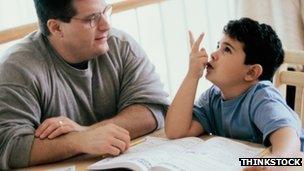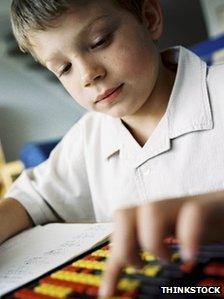Are parents being left out of the maths equation?
- Published
- comments

Helping your child with maths homework is almost a rite of passage
<bold>Primary schools in England need to do more to help pupils struggling with maths, says Ofsted. But have new teaching methods left parents out in the cold and unable to help?</bold>
There may be nothing as certain as a number, but the way children are taught to handle them has changed.
As any parent of a primary age child knows, pupils come home with an array of new props in their book bags and terms in their brains to help them tackle their maths homework.
Number lines and number grids have replaced counting on your hands, and perplexing terms like chunking and partitioning represent the new ways of tackling arithmetic in English and Welsh schools.
"Many parents talk about how they try to help their child with their homework and their child says: 'No, no. That's not the way we do it at school,'" says Rob Eastaway, co-author of Maths for Mums and Dads and a former president of the Mathematical Association.
"It's not that parents don't want to engage, but the language of the new methods can be intimidating."
He adds: "There are something like five or six techniques at the heart of arithmetic but it can sound really daunting. And the stuff that teachers send home to parents can look a bit like a management consultancy diagram."
But parents are a key factor in whether children succeed, particularly in the early years, when research suggests their influence outweighs that of schools.
Nick Dowrick, director of Every Child Counts, which helps struggling pupils in 2,000 schools, says it is vital that parents understand the methods that are being used in school.
When it offers support to struggling pupils, it urges parents to come in and watch the one-to-one coaching lessons it gives so they understand how things are done.
This sort of approach can work better than school hall events, which can be uncomfortable for parents, says Mr Eastaway.
He says: "Adults can be really hard to reach. They're afraid they will turn up and the teacher will put them on the spot."
Instead he runs sessions in which children take part in fun games and mind reading tricks in class, while the parents sit back and observe without being seen.
But why has maths teaching changed?
The president of the National Association of Mathematics Advisers, Lynn Churchman, says like most of her generation, she was taught maths in a "very didactic way".
"It's as if they cut off my head and poured knowledge in then stuck it back on again.
"The problem with this is that when they get to the point where their heads are filled up - they can start to struggle because they're not getting that conceptual understanding," she adds.
Mr Eastaway says old methods of multiplication and division are "a bit like a black box - you put a number in and you get another number out."
With methods like chunking and partitioning, children get to understand what is going on.
As Ms Churchman explains, modern maths teaching focuses on the key concepts, and a renewed emphasis on mental methods and strategies as opposed to recall.
'Instinctive'
"When you are parents, as adults you have been doing maths for a long time and you have your own experiences and your own already established knowledge that has been inculcated at an early age - it's almost instinctive," she says.
"What you've got to do, and this is where it's hard for parents, is lift yourself out of your own mindset about how you did it and not be worried when your six-year-old can't instinctively tell you what 17 and six is."
She explains that a lot of expectations about what children should be able to do at maths has come down in age range - so they need these new methods to help them understand quite demanding concepts.
She continues: "I think that means that parents have to try to imagine the children developing methods and strategies based on picturing something in their heads."
The methods are actually quite easy, she says, but what can be tricky is changing the parents' attitudes towards them.
And just a few years before the first children to learn by these methods are about to go on and become parents themselves, it seems that ministers could be about to turn back the clock in primary schools.
Schools Minister Nick Gibb has stated publicly that he favours the older methods that he himself was taught by, and that he believes it is not an issue if children do not understand why they work.
Algorithms
Ms Churchman says: "Mr Gibb believes that you can teach standard traditional algorithms and rules, and that it doesn't matter that children don't understand the concepts behind it.
"If he drives through changes backed by that philosophy, that could set primary maths achievement back years."

Could we see a return to the old methods?
Mr Eastaway also says there are significant risks associated with returning to the old methods, as many children just "didn't get them".
The Department for Education did not wish to comment on the concerns, saying its curriculum review due shortly would set out its plans for mathematics and other subjects.
Currently four out of five children are reaching the level expected of them at the end of primary school, and a third of 11-year-olds are reaching the standard expected of a 13-year-old.
But Ms Churchman says: "We are now ready for the next step change to make sure all children reach the levels expected of them."